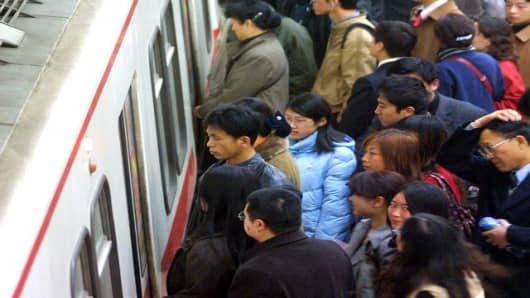One of Beijing's most important subway lines seized up on Monday when the mass of passengers forced workers to close off entrances for safety on the first working day of pre-Olympic traffic restrictions.
Passengers were being allowed off Line 2, which runs in a loop around central Beijing, but not on to it. At least one major transfer station, at Jianguomen, was closed.
"There is a big crush of passengers. We've had to close the line for safety reasons," said a subway worker, standing in front of locked gates at the Fuxingmen station, a transfer point for Line 1.
Three new subway lines opened over the weekend, including an express link to the airport, to help take up the burden from the traffic controls. The subway company was not immediately available for comment.
Monday marked the first working day of emergency traffic curbs that aim to take half of all cars off the road by utilizing an odd-even number plate system. Streets were noticeably quieter, but still busy during the morning rush hour.
Under the new rules, which began on Sunday, cars are banned on alternate days depending on their license plate number and most official cars have been impounded. Only taxis, buses and Olympic vehicles are exempt.
The government hopes to take around 60 percent of the city's 3.3 million cars off the roads, the official Xinhua agency reported, and reduce emissions by two-thirds over the two months until the end of the Paralympic Games in mid-September.
The city's chronic pollution has been one of the biggest headaches for Beijing Olympic Games organizers, who are banking on the car bans and last minute factory closures to bring blue skies and easy breathing for athletes.
Most building work has also halted and almost all earth and cement works have been closed, along with a string of factories -- including many in other provinces. Some are more than 100 kilometers away but still contribute to the pollution which earned the nickname "Grayjing" for the city.
Tianjin, a port city just east of Beijing and host to Olympic soccer qualifiers, has ordered 40 factories to close. Tangshan, a heavy industrial base northeast of Beijing will shut nearly 300 factories this month to improve air quality for the Games.
Taxis Happy, Drivers Mad
With more than 1,000 new cars hitting the street every day, Beijing is becoming one of the world's most congested cities. So taxi drivers, used to losing money as they idle in the city's epic traffic jams, were thrilled about the new regime.
"Its going to be great for business. Look the traffic is already so much better, its much easier to drive today," said a smiling Han Jianguo from behind the wheel of his cab.
Ordinary Beijingers were not all so enthusiastic, though most were willing to make sacrifices to ensure the Games run smoothly.
"The rules will certainly help (with congestion). But it will bring some real difficulties in transportation for ordinary people," said driver Liu Shuo, before his wife hushed him for criticizing Olympic preparations.
The city has warned that people who violate the rules will be caught by a high-tech surveillance network of over 10,000 "smart" devices, including cameras, ultrasonic and microwave scanners.
An extra 4 million people are expected to cram onto the city's already-crowded public transport network, although new Olympic metro lines and an airport express that opened at the weekend will provide some relief.
Some athletes still have lingering doubts about air quality, but Beijing says it is making an all-out effort. It has spent 120 billion yuan ($17.58 billion) to clean up the environment, and already ordered 300,000 high-emission cars off its roads.
It is keen to ensure a safe and attractive city as well as a pollution-free one, so extra security measures also started on Saturday and Beijingers took to the streets to help lost tourists and try to restrain their more unruly neighbors.
Hundreds of "social volunteers" policing a ban on unwelcome behavior like littering and spitting lined Beijing's main Chang'an avenue in matching red caps and red-trimmed polo shirts.



